February 13, 2015
Air Date: February 13, 2015
FULL SHOW
SEGMENTS

Snow and Financial Woes Bury Boston Transport
/ Steve Curwood, Bruce GellermanView the page for this story
In the last three weeks, record-breaking snowfall has blanketed New England, shutting down public transit and leaving many Bostonians stranded. Bruce Gellerman and host Steve Curwood report that while this frustrated and angered some, these snows have only piled more misery onto the mountain of financial problems Boston’s aging Massachusetts Bay Transport Authority (MBTA) already faces. (05:30)
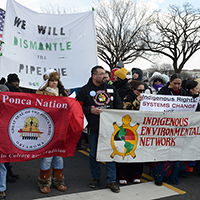
Tribal Nations Against Keystone Pipeline
View the page for this story
Legislation to approve the Keystone XL pipeline is now on the President’s desk, but the project has faced stiff opposition for years. As Dallas Goldtooth of the Indigenous Environmental Network tells host Steve Curwood, tribal nations say that despite the direct impact the pipeline’s route though their lands would have, the US government has failed to adequately consult and negotiate the matter with them. (08:30)
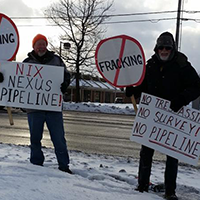
Pipeline Raises Safety and Property Rights Concerns for Landowners
/ Julie GrantView the page for this story
Pipelines that carry natural gas from well to refinery stretch hundreds of miles in the US, crossing public and private land. But as the Allegheny Front’s Julie Grant reports, landowners who learned that the proposed Nexus pipeline from southeast Ohio to Canada was to run across their property and carried risks of explosion, they banded together to protect their safety and property rights. (04:50)
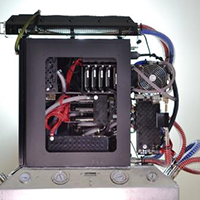
Surfing the Web to Heat Your Home
View the page for this story
To survive the snowy cold of winter, most people in the Northern United States heat their homes with oil, gas, or wood. Project Exergy wants to change all that, and founder Lawrence Orsini tells host Steve Curwood that we could soon be heating our homes with our personal computers. (09:10)

Beyond the Headlines
/ Peter DykstraView the page for this story
In this week’s trip beyond the headlines, Peter Dykstra tells host Steve Curwood about how the public tends to distrust scientific findings that come from an authority like the government; Oklahoma has become the earthquake capital in the US; and the Society of Environmental Journalists celebrates its 25th birthday. (05:00)

Gus Speth Calls for a "New" Environmentalism
View the page for this story
In conversation with host Steve Curwood, NRDC co-founder Gus Speth reflects on the environmental movement both as a previous ‘insider’ and now as a reformer. In his new memoir “Angels by the River” Gus Speth calls for deeper challenges to the economic status quo, and explores his life and career at the nexus of race, environment and politics. (14:30)
Show Credits and Funders
Show Transcript
HOST: Steve Curwood
GUESTS: Dallas Goldtooth, Lawrence Orsini, James Gustave Speth
REPORTERS: Bruce Gellerman, Julie Grant, Peter Dykstra
[THEME]
CURWOOD: From Public Radio International, this is Living on Earth.
[THEME]
CURWOOD: I'm Steve Curwood. As the Keystone XL pipeline legislation heads for the President’s desk, some Native Americans promise to continue their tough action to oppose it.
Goldtooth: There's been made public comments from the Rosebud Sioux tribe that they actually do already have an encampment on the proposed route for the pipeline. There are a number of other locations that tribes are really making a claim and saying, “This is our territory, our land and you shall not come through”.
CURWOOD: And the President has promised to veto the legislation anyway. Also, landowners are trying to assess possible dangers of high-pressure gas pipelines.
NEXUS: The experts are saying there’s so much pressure that the heat that’s going come through a small crack or a small orifice is going to self ignite, so we’re going to have an explosion.
CURWOOD: Pipeline worries and more this week on Living on Earth. Stick around.
[NEWSBREAK MUSIC: Boards Of Canada “Zoetrope” from “In A Beautiful Place Out In The Country” (Warp Records 2000)]
ANNOUNCER: Support for Living on Earth comes from United Technologies – innovating to make the world a better, more sustainable, place to live.
Snow and Financial Woes Bury Boston Transport
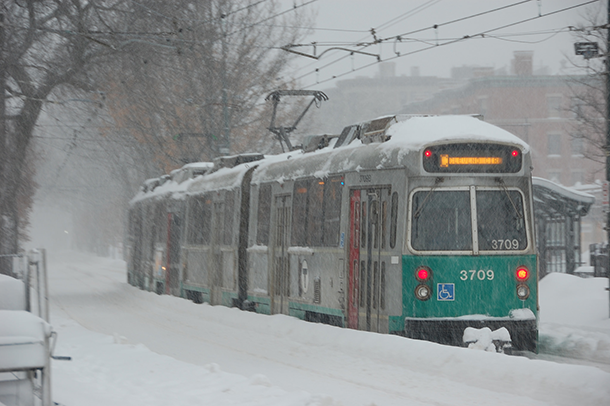
Snowfall in Boston slows MBTA service on the Green C line to Cleveland Circle. (Photo: MavVT; Flickr CC BY-NC-SA 2.0)
CURWOOD: From the Jennifer and Ted Stanley Studios in Boston and PRI, this is Living on Earth. I’m Steve Curwood.
[INTERCOM VOICE: The next Red Line train to Alewife does not take Customers.]
CURWOOD: That’s the message passengers on the oldest underground railway system in the country have heard far too often over the last couple of weeks, as ferocious weather dumped over six feet of snow on Boston. At least, they heard the message if the trains arrived at all. The MBTA, the Massachusetts Bay Transportation Authority, shut down totally for over 30 hours, as the creaking elderly ill-maintained subway trains proved no match for the piles of snow.

A tweet from the MBTA updating customers on service suspension. (Photo: MBTA)
PALMER: So, how was the commute this morning?
DOERING: Oh, it was awful! We show up to the T stop and we see all of these people waiting. And so, we’re like, “gosh, we’re not going to get on this train; we’re not going to get on the next three trains”. So we take it the opposite direction, so we can get on it earlier. And finally we get on, ya know, but it takes us two hours to get to our destination!
CURWOOD: The MBTA has suffered from decades of underfunding and neglect, and when Blizzard Nemo hit back in 2013, Boston’s public transit also shut down — that time for 48 hours that started in advance of the storm because officials were so concerned about the fragility of the system.

Park Street Station, Boston, Massachusetts, USA, circa 1898. (Photo: Wikimedia)
Much of the woes are due to severe underfunding and politics that have saddled it with a mountain of debt. And just before the latest storm, according to published reports, Charlie Baker, the newly elected Republican governor of Massachusetts, proposed cutting another $40 million from the budget for the state transportation system. So it is interesting that back in 2012 when Living on Earth’s Bruce Gellerman reported on the financial woes of public transit in Boston, one person who offered him an assessment was Stephanie Pollack who is now the Transportation Secretary for Governor Baker.
Here’s part of Bruce’s story that begins with her comments.
POLLACK: The MBTA is in pretty dire shape. We’ve basically been charging all the bills and making the minimum payments on the credit card, and we just figured out if you keep making the minimum payment, you never pay it off.

Park Street Station, Boston, Massachusetts, USA, today
GELLERMAN: Until a dozen years ago budgeting wasn’t a problem for the T because it didn’t have a budget. If at the end of a fiscal year, there was a shortfall in running the transit service – state lawmakers reached into general revenues and made up the difference. Then, in 2000, the legislature passed a measure called "Forward Funding.” The mass transit system was told to come up with a balanced budget and as part of the deal got 20 percent of all the revenue from the state sales tax.
POLLACK: And that was actually a huge victory. It amounts to half a billion dollars a year in revenue that the MBTA has that no one can touch. The problem is that gift came with some strings attached, including some pretty substantial debt and the requirement that the MBTA pay its way in the future.

MBTA services include buses, trolleys, subways and regional rail. (Photo: Wikimedia)
GELLERMAN: The strings were attached to the giant project known as Boston’s Big Dig. It’s a system of tunnels, and bridges under and around the downtown area. The Big Dig was the largest, most complex and costly construction project in US history.
In exchange for getting money from the state’s sales tax - the T inherited $3.3 billion in Big Dig debt. Delayed by a decade and plagued by design flaws, the price tag for the highway project tripled. Dan McNichol is author of the book "The Big Dig".
MCNICHOL: This is where the big leak took place, everything on the Big Dig was big, and the leak here pushed hundreds and hundreds of gallons every minute into the Big Dig tunnels. It was a major embarrassment - 15 billion dollar tunnel and it was leaking before it was even two or three years old.
GELLERMAN: Today, the T is drowning in Big Dig red ink. Revenue from the state sales tax didn’t increase as expected. So the T has had to borrow money. It’s issued bonds, and now its debt troubles have literally compounded… the original $3.3 billion owed to bondholders plus new debt has ballooned to almost $9 billion. For the Massachusetts Bay Transportation Authority, Forward Funding was spiraling out of control. Brian Kane, Budget and Policy Analyst with the T Advisory Board wrote a report about the problem. He called it: “Born Broke”.

The excavation of Tremont St for a new line in 1896.
KANE: But for that transference of debt, Forward Funding would have been a smashing success. Unfortunately, with the transference of that amount of debt and the mandate to pay the debt service on that debt, the T’s finance have been broken since 2000. So to maintain the system they borrow money…they borrow hundreds of millions of dollars every year to maintain the system… and they pay that out of the operating budget every year. And going forward they will continue to basically pay every dollar they earn in fares basically in debt service.
GELLERMAN: If I had to pay for my ride right now on the subway…what would it really cost?
KANE: Roughly $6 of which you pay $2. Fares are roughly 450 million dollars a year. Debt service is roughly $450 million a year. They don’t have enough money to operate the system let alone maintain it.

An MBTA Red Line subway car leaves the northbound platform at Downtown Crossing station. (Photo: Wikimedia)
CURWOOD: Brian Kane is now director of policy for the MBTA, and you can hear all of Bruce’s story on our website, LOE.org.
The tension between highway and transit support will be front and center as Congress deals with transportation legislation later this year. Nationwide the Highway Trust Fund is running on empty, and as Boston commuters are painfully aware, some public transit systems are in such tough shape that some days they don’t run at all.
Related links:
- Brian Kane wrote “Born Broke: How the MBTA found itself with too much debt, the corrosive effects of this debt, and a comparison of the T’s deficit to its peers”
- Transportation Finance in Massachusetts: Volume 2 Building a Sustainable Transportation Financing System
- MBTA’s twitter stream with service updates
- Living on Earth’s “Power Shift -The Trouble With Mass Transit”
Tribal Nations Against Keystone Pipeline
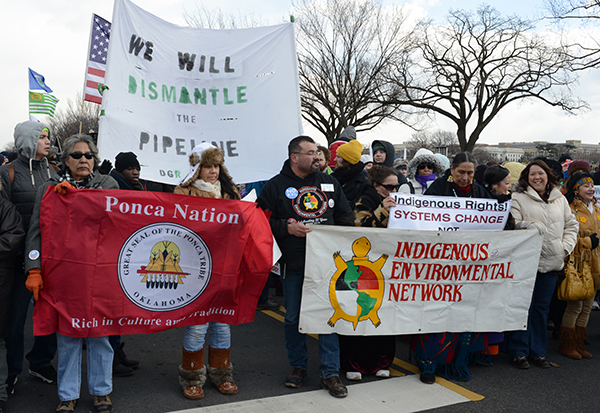
Tribal Nations and people from the Indigenous Environmental Network ban together to protest the Keystone XL pipeline. (Photo: Stephen Melksethian; Flickr CC BY-ND 2.0)
CURWOOD: Both houses of Congress have now passed the bill to allow the proposed Keystone XL pipeline that would bring tar sands oil from Canada to Gulf Coast refineries, and the measure is on President Obama’s desk where he’s promised a veto. The proposed pipeline has been a point of contention for various groups in the US and Canada, from environmental activists and unions to oil workers and tribal nations. On both sides of the border, tribes have been especially vocal in their objections, complaining of treaty violations as well as potential pollution as well as accelerated damage to climate stability. Dallas Goldtooth is campaign organizer for the Indigenous Environmental Network.
CURWOOD: And, Dallas, what's your tribal nation?
GOLDTOOTH: I'm Mdewakanton Dakota, from the lower Sioux Dakota nation in southern Minnesota.
CURWOOD: Now, tell me what tribal nations are primarily impacted by the proposed Keystone XL pipeline, and where are they?
GOLDTOOTH: Well, if you start from the very source of the tar sands - you go right to the tar sands development area in northern Alberta, you have the Dene and Creek Nations in that area who are the first ones on the front line from the actual extraction of the tar sands oil. The pipeline starts in southern Alberta which is in Blackfoot country and then moves all way down into the United States crossing Nakota, Dakota Anni tribal lands moving into South Dakota which is the lands of the area of the Oceti Sacowin which are the Dakota and Lakota tribes, and it moves on down through Nebraska which is traditional Omaha, Ho-chunk and Panka territories. So those are some of the tribes that this pipeline is proposed to run right through the traditional territories.
CURWOOD: What are the concerns expressed by tribal nations about Keystone XL?

Tribal nations and indigenous people at the People’s Climate March in NYC on September 21, 2014 oppose Keystone XL and other colonialism that might affect their way of life. (Photo: Light Brigading; Flickr CC BY-NC 2.0)
GOLDTOOTH: There's a number of concerns. I mean the primary concerns is that the permitting process, the State Department’s process in dealing with this has really overlooked tribal treaties with the federal government. I think that a lot of tribes are really frustrated at the lack of inclusion in this process, that's guaranteed through our treaty rights, and this pipeline is passing right through the heart of the Oceti Sacowin treaty area that was established before the Laramie Treaty back in 1868.
So, a lot of the tribal nations really stick to the wording and negotiated agreements that were made and are treaties and we really encourage the federal government to really stick to those, and so you know that's one of the primary concerns is just lack of inclusion, lack of discussion with tribal nations and how we feel about the issue. Another concern is the potential danger that the Keystone XL pipeline poses to our water. It is going to be crossing over the Ogallala Aquifer, which feeds into well over 200,000 people in South Dakota, but also provides a vast amount of resources to the agricultural breadbasket of America. The potential for a spill there is far too great of a risk for not only tribal members but for non-native people to take in this region.
CURWOOD: What do tribal nations do to express these concerns?
GOLDTOOTH: They've tried a number of different ways to really express their frustration, and a lot of it is through the established mechanisms between the federal government. You know, one of the primary things is that the State Department, in its FEIS, was to consult with tribal nations on the issue and get their input. That hasn't happened. There hasn't been a really full and proper consultation with the tribes, and the tribes have made that known in a number of letters to the Department of Interior, the State Department, expressing frustration with this process.
CURWOOD: What would be considered an appropriate way for the US federal government to consult with tribal nations on Keystone?
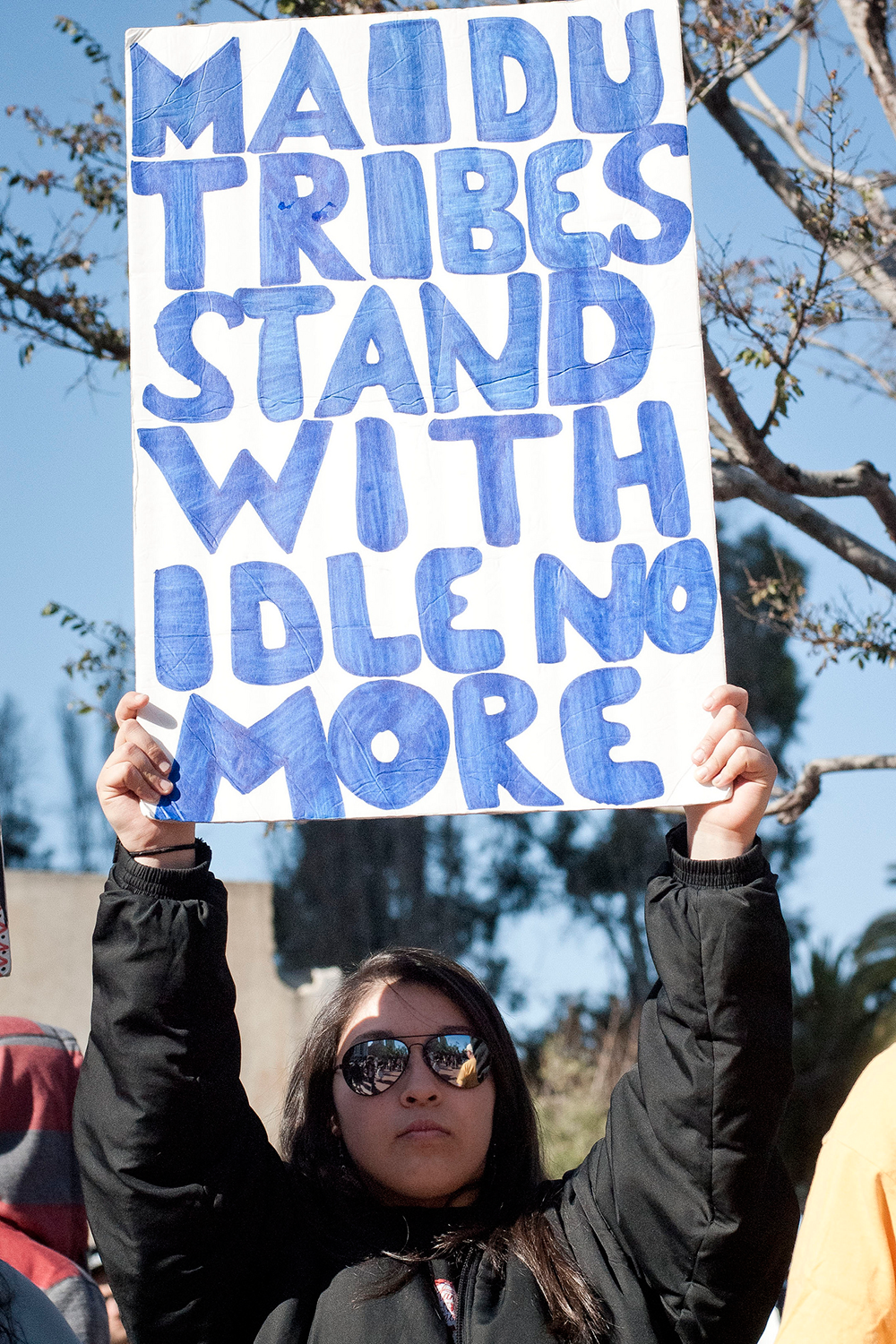
The Maidu Tribes stand with the Idle No More movement, which advocates for, “A peaceful revolution to honour Indigenous sovereignty and to protect the land & water.” (Photo: Sasha Kimel; Flickr CC BY 2.0)
GOLDTOOTH: To get right to the point, the tribes have actually stated themselves that they would like to have President Obama or actually Secretary Kerry of the State Department to actually sit down with the tribes. Given the federal Indian law that we have a nation-to-nation relationship with the federal government, that just seems proper. The State Department, when they talked about that they consulted with tribes, some of those consultation "meetings" were conference calls with seven different tribes in the room and a low-level person or they were in-person meetings, but it was always a low-level person within the State Department. A lot of tribes just found that offensive to be plain spoken, as they expect something higher up given the nation-to-nation relationship.
CURWOOD: Now, the Environment Protection Agency, the US Environment Protection Agency, recently released a letter stating that many of the concerns regarding Keystone XL were not probably evaluated or under evaluated, and some of those do pertain to tribal nations concerns. What's your take on that letter from the EPA? How far did it go to meet your concerns do you think?
GOLDTOOTH: You know the Indigenous Environment Network organization really does applaud EPA to really change their stance on it. I know that last year, the last comments on the FEIS that they weren't as forthcoming with criticism of the pipeline’s impacts, and also the tar sands impacts. I think that the biggest switch and that I really do appreciate is that this acknowledgment that the Keystone XL pipeline will contribute to greater carbon emissions, carbon pollution, it will contribute to an encouragement for companies and corporations in the tar sands area to continue to actually ramp up and increase oil production. I think that has always been a talking point that proponents of the pipeline have always used and continue to say that this will not contribute to greater carbon pollution, but that's just plain not true, and so I really do appreciate the EPA stepping forward and making that note.
CURWOOD: How tough do you think tribal nations will be if for some reason the Keystone XL goes forward and they try to bring the pipeline across the tribal nation land?
GOLDTOOTH: A lot of people are well aware of the feistiness of Lakota Dakota people especially in relationship to foreign entities coming in without their consent and consultation, so should the pipeline be put into a situation where it does get approved and it's looking to be constructed, expect a very robust and strong response from the tribes along the route of the pipeline.
CURWOOD: Of course, the Lakota and others have a pretty tough reputation in American history. I mean, we all think of the Battle of Little Bighorn, and the tribal nations won.
GOLDTOOTH: Exactly. Our tribes, the Oceti Sacowin, the Lakota, Dakota, and the Nakota nations are very proud of our political activism. I can't speak for the tribes myself, but I know that it has been made in public comments from the Rosebud Sioux tribe that they actually do already have an encampment on the proposed route for the pipeline. Should the pipeline get approved, they are going to ramp up that encampment and make sure that there's a strong presence there throughout the process. And I know that there are a number of other locations that tribes are really making a claim and saying, "This is our territory, our land, and you shall not come through."

Tribal nations and indigenous peoples in NYC at the People’s Climate March walk, united, against the actions that would worsen climate change. (Photo: Emmett FitzGerald)
CURWOOD: Dallas, there's a movement called "Idle No More" which and let me quote here, "calls on all people to join in a peaceful revolution to honor indigenous sovereignty and to protect the land and water". It seems to be particularly strong in Canada. To what extent is the Keystone XL pipeline controversy producing alliances, allegiance, among US tribal nations and the first nations in Canada and elsewhere?
GOLDTOOTH: It's an amazing thing to see. A lot of our tribal nations have developed strong ties with other tribal nations that are fighting oil development and fracking development in their own respective areas. We're talking with folks in British Columbia and they're resisting the Gateway pipeline up in British Columbia. We're also looking ahead to Energy East which TransCanada they're already claiming as the new...that's the next route. Should Keystone XL be defeated they're going to put resources into this Energy East pipeline. Well, we're already working with communities along that route, native and non-native to provide support and give them, "Hey, this is what we did. Let's see if we can fight it here". You know, we also stand in solidarity with our brothers and sisters who are on the front lines up in the tar sands northern Alberta who are seeing cancer at appalling rates. And so, we don't see a border between Canada and the United States. What we see are fellow native people that are suffering because of continued colonial process of extracting minerals and resources from our communities without our consent. And so we really want to stand in solidarity across no matter what border may be with our indigenous brothers and sisters.
CURWOOD: Dallas Goldtooth is a Campaign Organizer for the Indigenous Environmental Network. Thanks so much for taking the time with me today.
GOLDTOOTH: I am so happy. Thank you very much for listening.
Related links:
- Indigenous Environmental Network’s response to KXL
- Idle No More
- EPA’s comments to the State Department’s environmental analysis of KXL
- Obama prepares to veto KXL
- More about the KXL pipeline
- Living on Earth’s coverage of the People’s Climate March in NYC
[MUSIC: ]
CURWOOD: Coming up...Keystone XL isn’t the only proposed pipeline under fire. There's also public distrust about plans to transport natural gas across several states. Stay tuned to Living on Earth.
[CUTAWAY MUSIC: ]
Pipeline Raises Safety and Property Rights Concerns for Landowners
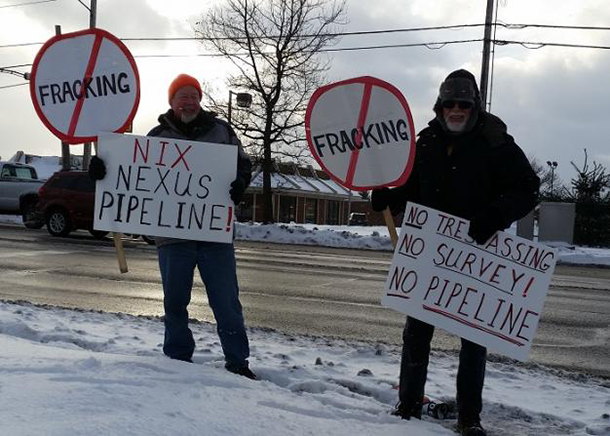
Anti-pipeline activists outside Nexus pipeline meeting, Wadsworth, Ohio. (Photo: Julie Grant)
CURWOOD: It's Living on Earth. I'm Steve Curwood.
WOMAN: Who’s here to stop the pipeline?
[CROWD CHEERS]
MAN: Is this pipeline the right decision for Massachusetts? Is it the right decision for New England?
[CROWD BOOS]
MAN: Alright, that’s what I’m thinking too.
CURWOOD: Those are protesters outside the Massachusetts State House in July 2014, objecting to Northeast Energy Direct, a proposed high-pressure natural gas pipeline that would cross the north of the state to link a gas hub in New York state with one in eastern Massachusetts.
MAN: There are better avenues if they need to get gas into the Boston metropolitan area and certainly not destroying beautiful properties such as ours - it’s just not necessary.
CURWOOD: Whether or not the demonstrations influenced Kinder Morgan Energy, the company that wants to build the pipeline, it has since proposed a more northerly route for the link through New Hampshire.
Still, the eastern US isn’t the only place where there is conflict over gas pipeline expansion. In the Midwest, the Nexus pipeline that would run 250 miles from gas wells in southeast Ohio through Michigan to Canada is drawing opposition from landowners concerned about their safety and property rights, as the Allegheny Front’s Julie Grant reports.
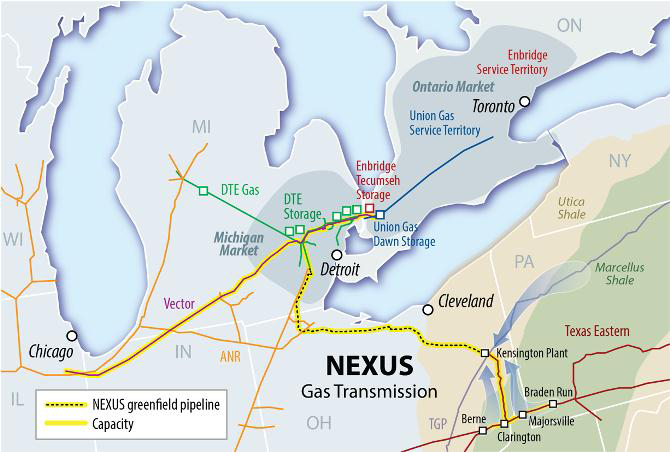
The Nexus pipeline would run 250 miles from gas wells in southeast Ohio through Michigan to Canada. (Photo: Spectra Energy)
GRANT: Paul Gierosky isn’t what you might expect in an anti-pipeline activist. He’s a businessman. He and his wife Elizabeth have been renovating their dream home in fast-growing Medina County, in northeast Ohio, for the past two years. Sitting among the trees, it’s got the feel of an upscale cabin, with wood beamed ceilings and large windows.
ELIZABETH: We wanted to be able to see the land, because it’s so beautiful. So really from every room you can see outside and see the property.
GRANT: But before they even finished moving in, the Gieroskys got a notice: their new property was in what’s called a study corridor for the Nexus pipeline. Nexus is a joint venture of DTE Energy of Michigan and Spectra Energy of Houston. The pipeline would start in southeastern Ohio, and head north and west, through their property, as well as hundreds of others on its way to Michigan and Canada. The company wants to survey the Gierosky’s front yard, to see if they can dig it up to lay their new line. The more the Gieroskys looked into it, the more upset they got.
GIEROSKI: So our first concern started out to be safety.
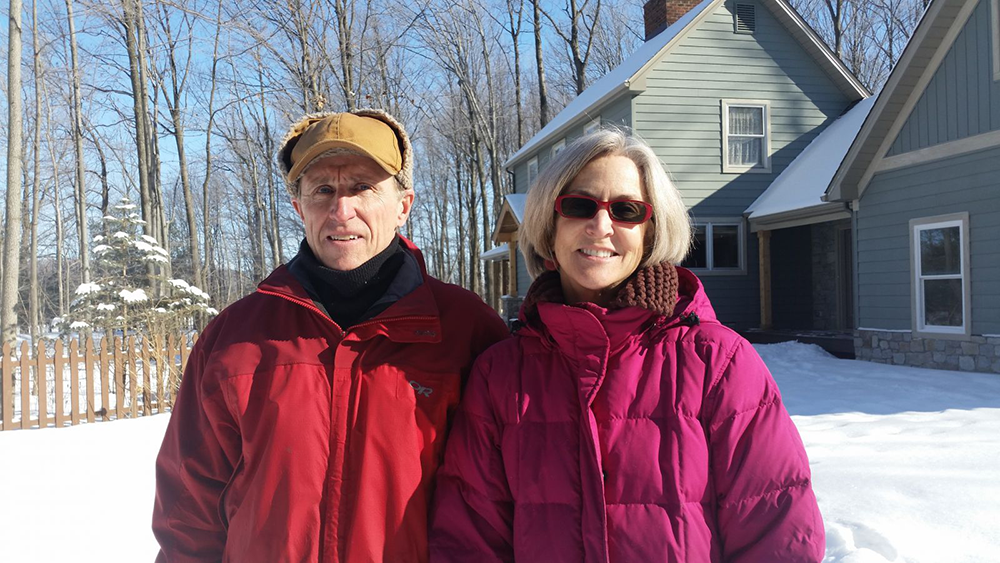
Paul and Elizabeth Gieorsky at their home in Medina County, Ohio (Photo: Julie Grant)
GRANT: It would be 42-inches wide. Gierosky holds his arms high and wide in the air above his head.
GIEROSKI: You understand how big the pipeline is?
GRANT: Gierosky worries what would happen if someone accidentally shoveled into it,
GIEROSKI: The experts are saying there’s so much pressure that the heat that’s going to come through a small crack or small orifice is going to self-ignite, so we’re going to have an explosion.
GRANT: He and a coalition of other concerned citizens from around the state have joined together to get the pipeline rerouted through a less densely populated area. And they’ve convinced many local township and county governments to join them.
[PUBLIC MEETING]
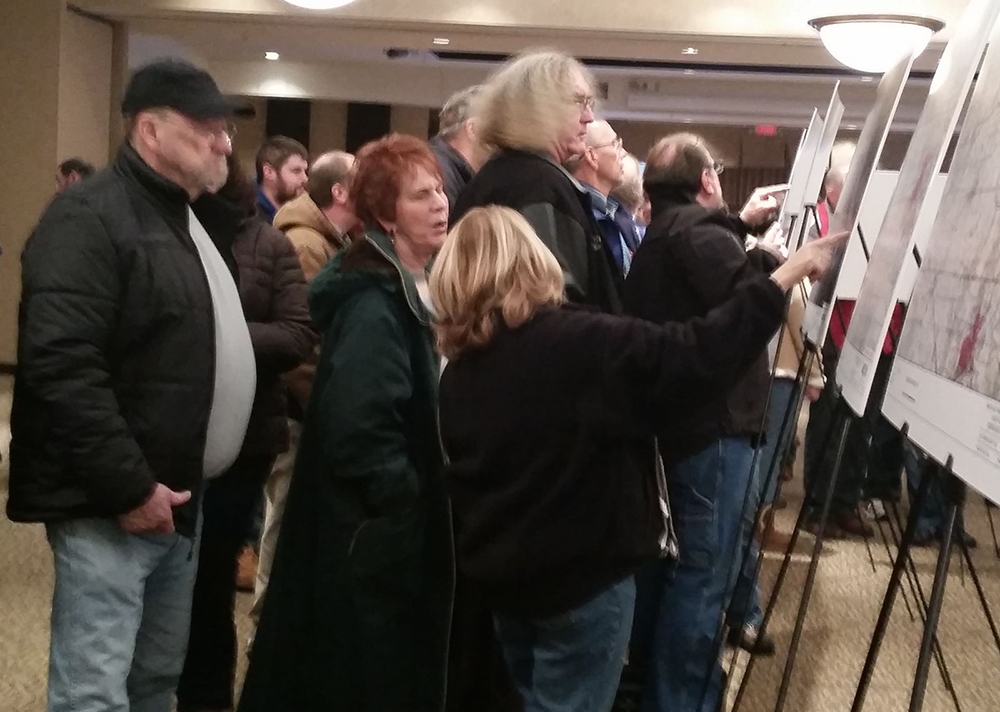
Nexus pipeline developers' public meeting in Wadsworth, Ohio (Photo: Julie Grant)
GRANT: Three hundred concerned landowners, farmers, local officials and others showed up at a public meeting held by Nexus this week. A hundred blue-shirted Nexus representatives were there ready to answer questions. Still, Maureen Hardy was disheartened. She got notice in recent months that a pipeline compression station was planned near her house. She didn’t even know what it was. But she’s worried it's loud and polluting.
HARDY: I’ve talked to several different people from Nexus and gotten several different answers.
GRANT: Nexus spokesman Arthur Dietsel says the company is holding meetings like this all month to hear concerns, before finalizing the pipeline route.
DIETSEL: There’s nothing set in stone. This route will continue to evolve over the course of the next year.
GRANT: Nexus has started the permitting process through the Federal Energy Regulatory Commission, or FERC, which needs to approve the pipeline route. FERC’s Joanne Wachholder is manager of the government’s review.
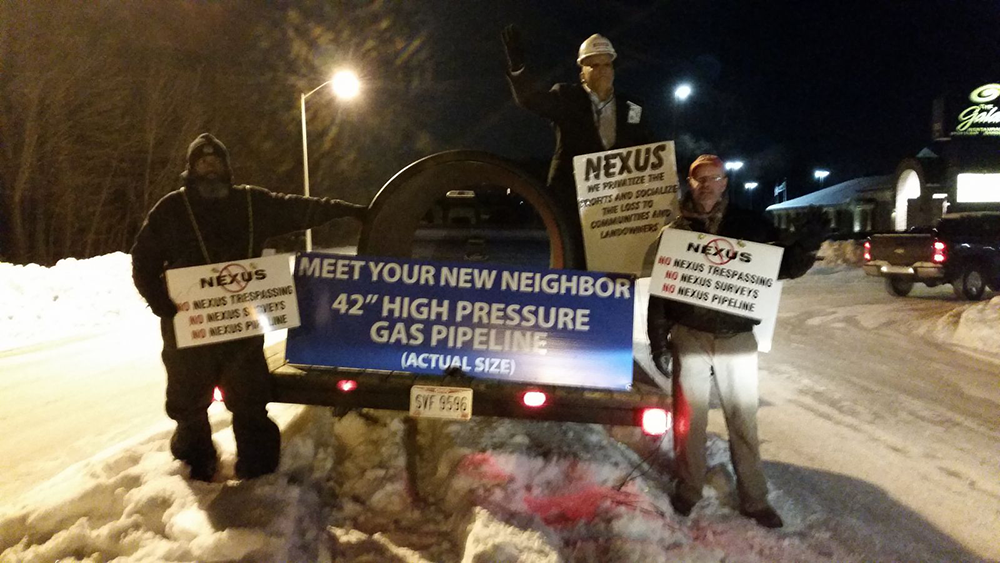
Anti-pipeline activists outside Nexus meeting in Wadsworth. (Photo: Julie Grant)
WACHTHOLDER: We have engineers that review safety. We have biologists, like myself, that review the waters and wetlands and endangered species and vegetation.
GRANT: But some landowners at the meeting don’t believe FERC will address their concerns. Mario Pasolini lives in Seville, a small farming community. He says FERC will approve Nexus.
PASOLINI: There's no doubt about it. They’re in the business to rubber stamp pipelines.
GRANT: Pasolini and landowners he’s joined with want to stop the pipeline from being built. He plans to fight Nexus in court. If they try to take his property, he plans to argue that eminent domain is only supposed to used for a public use, like a highway or railroad.
PASOLINI: This is a private, Fortune 500 company called Spectra Energy, and they’re in this to make money.
GRANT: Pasolini says the gas is heading for Canada, and isn’t going to be a public good in Ohio. Nexus says they’re are already plan to submit a formal application to FERC later this year. I’m Julie Grant.
CURWOOD: Julie Grant is with the public radio program, the Allegheny Front.
Related links:
- More on the story on Allegheny Front
- Nexus Pipeline
- Compressor Stations associated with the pipeline
- Federal Energy Regulatory Commission (FERC) needs to approve the pipeline
[MUSIC]
Surfing the Web to Heat Your Home
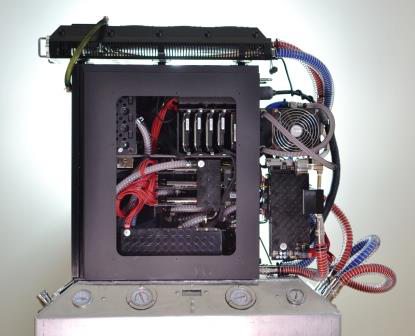
Project Exergy's prototype is called Henry (Photo: Project Exergy)
CURWOOD: In rough winters like this one, where at times it’s been below freezing in every one of the 50 United States including Hawaii, few have avoided the cost and hassles of heating. And now there is a technology on the horizon that could make the burning of gas, oil and wood to heat homes obsolete, thanks to computers. A new company called Project Exergy is developing a way to capture the waste heat from computing to keep our houses warm. Lawrence Orsini is the founder of Project Exergy and he says his innovation is based on the fact most of the energy used by our personal computers is turned into heat.
ORSINI: Computers are really efficient little resistance heaters. The amount that gets used in computation is so small it probably can't be measured. So the majority of it, all of it really, is converted directly to heat. So every watt that goes in comes out of the computer as a watt of heat.
CURWOOD: And so right now we spend a lot of energy trying to cool down computers whether at home or the big ones at the office. How hard is it do you think to capture all that heat and put it to work instead of throwing it away?
ORSINI: Well, so the interesting thing that maybe differentiates our project a little bit from others that are looking at this is we’re not just really looking at just capturing heat. We want to generate significantly more heat. We're actually running these things a little bit different than most people do. Instead of running them cool and capturing the heat that normally generate, we look to run them really hot, so we're taking a different twist on this.
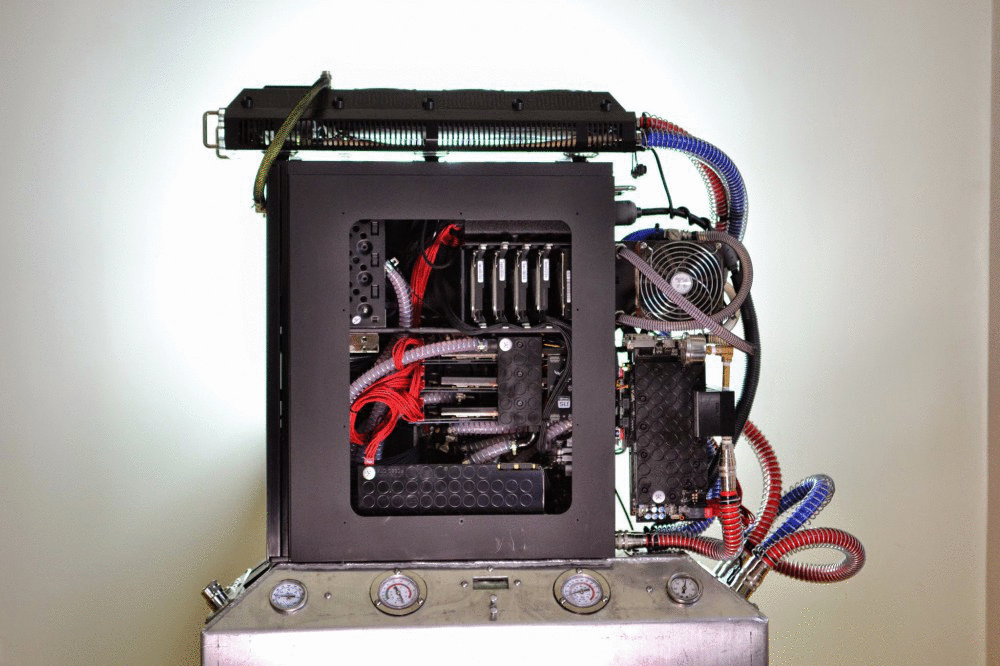
Project Exergy's prototype is called Henry (Photo: Project Exergy)
CURWOOD: So why do you want to have the computer run hot, hot, hot, especially if it doesn't like being run hot, hot, hot?
ORSINI: Well, I've been in the energy industry for about 15 years, and I've had the opportunity to look out across the US and see where energy gets consumed. So there's some good data that the US Energy Information Administration has on consumption of natural resources and energy in buildings. So about 40 percent of all the energy that’s consumed in the US happens in commercial and residential buildings themselves, and close to half of that energy is used for heat, so it was interesting to me comparing that or actually contrasting that against the two to three percent of electricity that's being used today in data centers. And thinking about the way that data centers work, you know, and thinking about the way industry thinks about computers, they really try hard to keep those computers cold. A significant amount of energy actually goes into refrigerating the heat out of data centers and putting it out into the atmosphere. In fact, some of the most efficient data centers are actually moving closer and closer to the Arctic Circle to cooler climates so they can just take the roof off and let the heat go directly to the atmosphere. To me, that seems a little bit backwards. If our economy and buildings and industry actually run on heat, then we ought to be focused on making that heat and not getting rid of it in our data centers. So the idea of running computers hotter comes from that notion, the notion that if we need a significant amount of heat, let's figure out a different way to run computers and create that heat with computers.
CURWOOD: So go online and look at Facebook and help recycle that heat, huh?
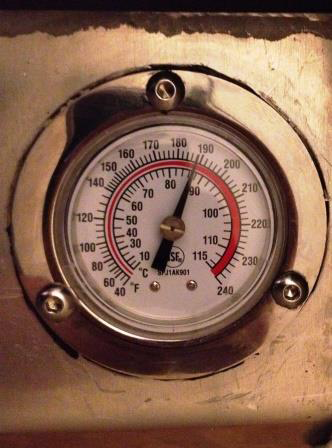
Henry's temperature gauge (Photo: Project Exergy)
ORSINI: That's it. Yeah. I mean there's there's a lot of reasons for us to really consider this. Science Daily pointed out, I guess overall, that 90 percent of all the data in the world has been generated over the last two years, and I don't think anyone's predicting, you know, that it's going to slow down at all, it's actually accelerating. Think about how that's going to impact the energy consumed in data centers...it's headed for the roof. I personally don't think we're going to be able to sustain that without doing something like this. So disturbing the computation and putting the heat where we need the heat is a much better way to do it. It's pretty hard to ship heat, it's pretty easy to ship data.
CURWOOD: Now, Lawrence, today's computers are made with the concern that they could overheat so manufactures try to minimize the heat that the processor is exposed to, but you want reverse that. You want computers to crank out as much heat as possible and you have a prototype named Henry?
ORSINI: We do, Steve, yeah. We spent the last two years working on Henry, figuring out how to make it actually run significantly hotter, so Henry's a liquid cooled high-performance computer that makes significantly more heat than a typical computer does, in fact, we've been able to boil water across some of the heat exchangers that are on the cooling...that are on the graphics cards and actually storing the thermal storage tank almost 200 degree Fahrenheit water. So that's pretty hot. I personally don't know of any other personal computers that are running that hot, and we can put this in every house in the US. In fact if we did that and we distributed that 2 to 3 percent of energy that is being used in data centers, some of our rough calculations say that we can probably heat near 80 million houses.
CURWOOD: By the way, how big is the computer that's the source of the heat that you use for your home?
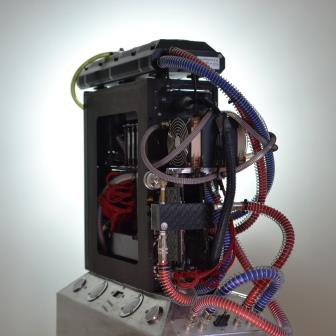
Project Exergy's prototype is called Henry (Photo: Project Exergy)
ORSINI: Well, the computer itself is the size of a - well it’s a little bit bigger than the normal tower PC. In fact, we specifically chose to make it out off-the-shelf parts so you know there is no Star Trek technology in this thing. It's made out of things that you could go buy from the computer store today.
CURWOOD: And how much of your home does it keep warm?
ORSINI: Well, we live here in Manhattan so the building carries a little bit of its own warmth, but you know over the winter, the last two years, last year and this year, we haven't turned heaters on once.
CURWOOD: So, by the way, how possible would it be to share energy among homes so that a home that is creating a lot more heat than it needs could give as well as sell that heat to someone else. Heat is somewhat hard to move around, I gather?
ORSINI: It is a little bit hard to move around. One of the components we're designing to work with this is a thermal storage tank. This thermal storage tank is filled with phase change material that holds significantly more heat than say your water heater would, so you can run it hard and sock away a lot of that heat. So we've had some brainstorming sessions for some of the team and said, "You know we could probably make it so that these thermal storage tanks are removable so that if you have a need for computing and you didn't have a need for heat you can share the heat with your neighbors by taking the storage tanks next-door and dropping it in their house and running it in their house.
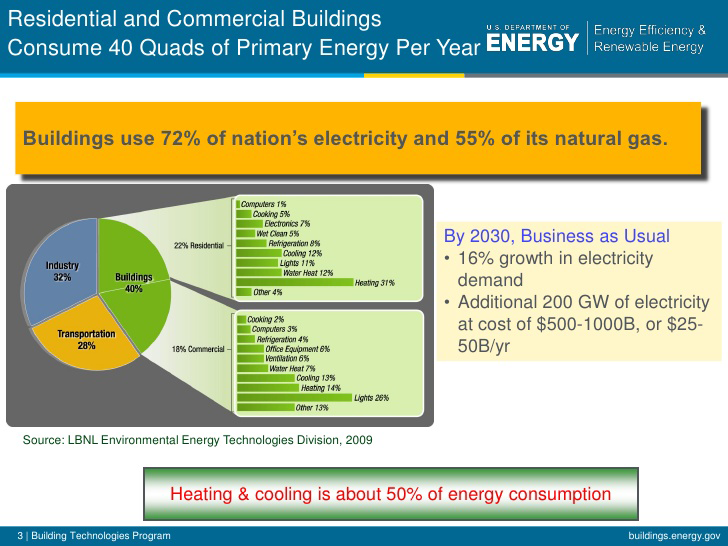
Heating and cooling is about 50% of overall energy consumption. (Photo: DOE)
CURWOOD: So how long before I could begin capturing some of the heat from my computer?
ORSINI: Well that depends on how quickly we can get this thing together. So the next stage of development, we've just launched a Kickstarter campaign so we can fund the next couple of prototypes and then pursue some research funds with the Department of Energy as well. If we can manage to land those things then we'll probably have a few prototypes in the field by the end of the year, and if those do well then I would say in two years we would be ready for a production run of units that you might be able to put into your house.
CURWOOD: Lawrence, I don't want to discourage you but there's a lot of money made in making computers these days by some pretty big companies and all their stuff will become obsolete if what you're talking about will come into play. How can you change this whole industry to take advantage of this energy?
ORSINI: Well, quite a few people have said that this is an intentionally very disruptive technology and I don't choose to think of it that way. I think a lot of companies out there like Amazon, Google, Microsoft, those folks have been innovators, and an idea like this would encourage them to jump into innovation once again. There's a need in our country I think for sort of a new vision, a new industrial revolution. So I would love to see companies like that jump on the bandwagon and start innovating alongside us. This is something that's going to happen. If you look at how energy consumption is climbing through the roof on computation, we have to do something about that. I don't think it’s sustainable personally.
CURWOOD: I'm wondering if you have a dream configuration, which consists of a bunch of solar panels outside collecting all this electricity to drive these computers that are heating homes on a neighborhood, house by house, neighborhood by neighborhood basis, so that we would never need gas oil coal like that again.
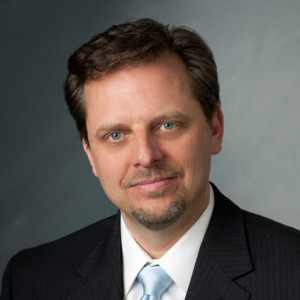
Lawrence Orsini (Photo: Project Exergy)
ORSINI: You have looked into my future. [LAUGHS] Yeah, being in the energy industry and watching what's happening to distributor generation and the way that solar photovoltaics are proliferating, Henry would be a perfect device to connect with a PV system because when you think about it the PV system produces electricity when the sun comes up, and if you have a load that actually produced the majority of the benefit you need for your house, which is heat, that also started working when that electricity started producing, then you've got a pretty interesting combination of technologies, and because the heat is stored in the thermal storage tank, you can use it whenever you want to. You don't have to use it just when the computer’s running, so Henry actually makes some of the largest loads in your house adaptive to great condition making the local grid around you far more resilient and hopefully bringing everybody's utility costs down.
CURWOOD: Lawrence Orsini is the founder of Project Exergy. Thanks so much for taking the time today, Lawrence.
ORSINI: Absolutely, thank you so much for having me.
Related links:
- Project Exergy
- Project Exergy Kickstarter
[MUSIC]
CURWOOD: Just ahead...a veteran environmentalist calls for a society that puts people and the planet ahead of product and profit. That’s coming up on Living on Earth. Stay tuned.
ANNOUNCER: Funding for Living on Earth comes from United Technologies, a provider to the aerospace and building systems industries worldwide. UTC Building & Industrial Systems provides building technologies and supplies, container refrigeration systems that transport and preserve food, and medicine with brands such as Otis, Carrier, Chubb, Edwards and Kidde. This is PRI, Public Radio International.
[CUTAWAY MUSIC]
Beyond the Headlines

The anti-vaccination movement, against medical advice, has contributed to the rise in rates of nearly eradicated diseases like measles. (Photo: DFID- UK Department for International Development; Flickr CC BY 2.0)
CURWOOD: It's Living on Earth. I'm Steve Curwood. Let’s peer beyond the headlines now, with Peter Dykstra. He’s with Environmental Health News, that’s EHN.org and the DailyClimate.org. Peter joins us on the line now from Conyers, Georgia. Hi there, what struck your fancy?
DYKSTRA: Hi, Steve, well, not to be insensitive, but I never thought I’d have so much fun following the impact of a hundred or so cases of measles.
CURWOOD: Well, you’re right, that’s not a standard form of recreation, so where's the fun?
DYKSTRA: The fact that a disease we thought we’d eradicated by vaccination is making a little comeback and of course there’s nothing fun about that by itself. But you have to laugh at how we sometimes want no part of what scientists tell us. When they tell us Ebola has little chance of being a threat to the US, millions of us freak out anyway. When the scientists say that maybe we should freak out a little over climate change, millions of us see it as a hoax or a sinister plot.
CURWOOD: Yeah, but are you saying that there’s a vast and sinister connection between denying the science on vaccinations and Ebola and climate change?
DYKSTRA: No, of course there’s no conspiracy, just a consistent, very unfortunate tendency in human nature to keep repeating the same mistakes. The best story I’ve seen on this lately comes from Joel Achenbach, writing in the National Geographic. He argues that people just don’t like having other people – particularly when those people are in the government – tell us what to do. And he throws in a couple of other epic examples. The first one, fluoride in our water. The fluoridation thing was a key element in the plot of the movie “Doctor Strangelove” 51 years ago. And if you think measles are fun, you should try a movie that starts a nuclear war over fluoride paranoia. But also two years ago, voters in Portland, Oregon, rejected an attempt by the city to fluoridate its water. It’s the fourth time that Portlandia has turned back fluoridation due to the mistrust of adding fluoride to water supplies despite ample evidence of its health benefits.
CURWOOD: Well, Peter, I do know in the case of fluoride there are also legitimate studies raising questions about risks as well as the benefits.
DYKSTRA: Correct, but here’s another one that is literally from outer space: the indestructible belief among some folks that NASA faked those moon landings.
CURWOOD: I'm laughing at that one. I mean you don’t even need rocket science to figure that one out, and I know Buzz Aldrin gets upset when people say he faked his walk on the moon.
DYKSTRA: Well, funny thing about all that. Buzz Aldrin IS a rocket scientist as a matter of fact, but he’s on record as saying he has doubts that humans have caused climate change.
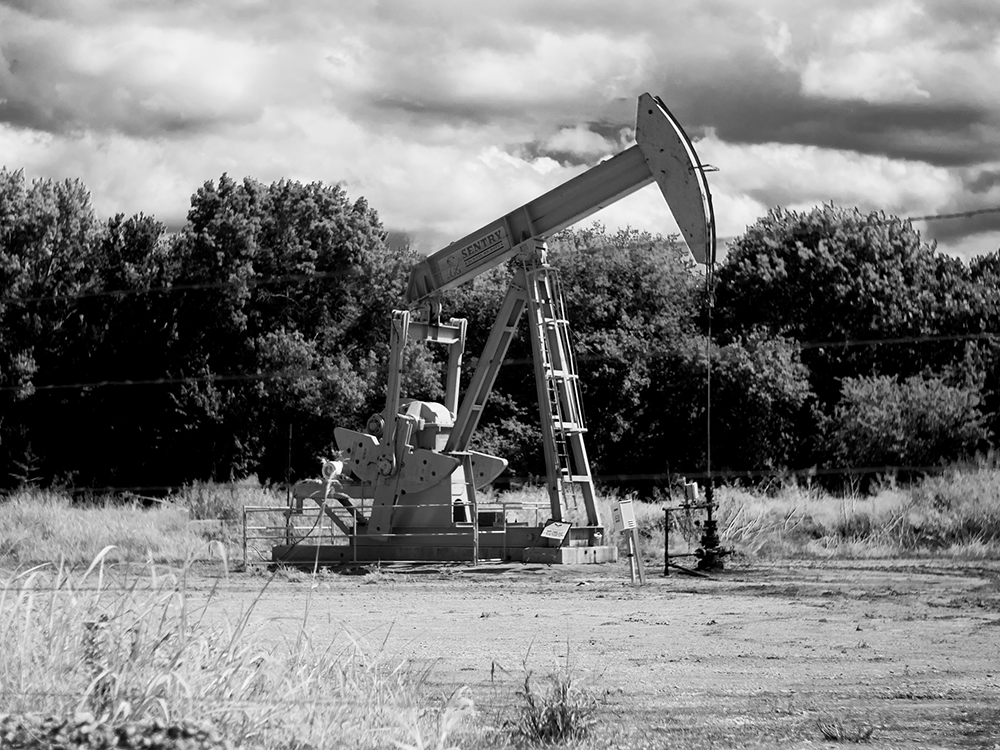
Injection of wastewater near fracking sites in Oklahoma has led to a dramatic increase in the number of earthquakes the state has experienced. (Photo: Public Herald; Flickr CC BY-NC-ND 2.0)
CURWOOD: Oh, my. What else do you have this week?
DYKSTRA: Guess which state just zoomed past California as America’s earthquake capital?
CURWOOD: Tell me.
DYKSTRA: [SINGING] Ooooh-kla-homa, where the wind comes sweeping down the plain. They now have it going on underground, too. Scientists have tied the practice of injecting fracking wastewater into the ground to a sudden uptick in earthquakes in places like Ohio, which doesn’t have much of a seismic history. But in Oklahoma, it’s more of a swarm than a sudden uptick: the state had three times as many quakes in 2014 as the traditional champion, California.
CURWOOD: And what’s the level of concern about causing damage from these quakes?
DYKSTRA: Some of the quakes have edged up into the 4.0 range, that’s when they begin to see damage to buildings. A new study this week by the Oklahoma Geological Survey looked at two counties in the north central part of the state where injecting fracking waste into the ground has grown five-fold. In 2011, there were no earthquakes in Grant and Alfalfa Counties. Last year, there were 177.
CURWOOD: You don’t say. So, what's shaking on the environmental calendar this week?
DYKSTRA: A self-interested 25th birthday shout-out to an organization that’s central to what we do here. The Society of Environmental Journalists turns 25 this weekend.
CURWOOD: And you and I Peter are both members and participants...
DYKSTRA: ...and for good reason. These are not easy subjects to cover, and SEJ brings together a lot of smart, hard-working people to swap experience and information. They have a great annual conference, this year in Oklahoma, America’s new earthquake capital. And can I reach back into the annals of SEJ history to tell the story of their birth, and how Sam Donaldson was a major inspiration?
CURWOOD: Yeah, man, go for it!

The Society of Environmental Journalist’s logo (Photo: SEJ)
DYKSTRA: Well, Sam Donaldson of ABC News was a TV news star back then, king of the White House beat. But when he left the beat at the end of the 1980’s to host a weekly show called “Prime Time Live,” a reporter asked him if he was in fact being demoted, and in his legendary deep baritone voice Sam said “No.” It wasn’t a demotion and to drive home his point about what a major journalism demotion would be, he said, “No one’s shifting me to the ecology beat.”
CURWOOD: Oh man!
DYKSTRA: So a lot of environmental journalism experts took that as a sign that they better stick together to get some respect and SEJ was born on Valentine’s Day, 1990.
CURWOOD: So, happy birthday, and happy Valentine's Day to SEJ. There's more on all these stories at our website, LOE.org. Thanks, Peter!
DYKSTRA: Anytime, Steve, we'll talk to you soon.
CURWOOD: Peter Dykstra is with EHN.org and DailyClimate.org and we're both with SEJ.org.
Related links:
- National Geographic story about science doubters
- Voters in Portland, Oregon reject fluoridated water
- Astronaut and rocket scientist Buzz Aldrin is skeptical about human-caused climate change
- Oklahoma worries over swarm of earthquakes and connection to oil industry
- Oklahoma had three times as many earthquakes in 2014 as California
- A study in Oklahoma’s Grant and Alfalfa counties: Earthquake numbers have grown 5-fold
- The Society of Environmental Journalists
[MUSIC]
Gus Speth Calls for a "New" Environmentalism

Gus Speth’s new memoir, Angels by the River, describes his evolution from accepting the status quo as a child, to working within mainstream environmentalism for environmental protection, to calling for “a new environmentalism.” (Photo: Chelsea Green Publishing)
CURWOOD: James Gustave Speth is a veteran of the environmental movement, as a co-founder of the NRDC, founder of the World Resources Institute, CEO of the UN Development Programme and President Carter’s Chair of the Council on Environmental Quality. Despite having held several key positions in the mainstream of environmental policy, Gus Speth is now calling for a more urgent and demanding environmental movement, and he’s acting on these convictions. In 2011, he was arrested in front of the White House alongside Bill McKibben and others in a peaceful protest against the Keystone XL pipeline. He’s just written a memoir “Angels by the River” that examines how his Southern upbringing and career shaped the person he is today. Gus Speth joins us from his home in rural Vermont. Gus, welcome back to Living on Earth.
SPETH: Thank you Steve, it’s good to be back.
CURWOOD: Now, Gus, you grew up in the South in Orangeburg, South Carolina. What was it like to grow up there as a white person in the 50s and 60s?
SPETH: Orangeburg was an idyllic town in many ways, for certainly white people to grow up. It was thoroughly segregated, if you can imagine Jim Crow at its peak, we were there. By the time I got to Yale as an undergraduate it dawned on me in a major way that this was a system that was deeply unjust and degrading and something that we had to change. You know when the scaffolding of your cultural life and your upbringing sort of collapse around you, it can be disorienting because everything you were brought up to believe in and take as natural and inevitable, it all of a sudden disappears. And for me, I found it was very liberating experience. I realize that I could make up my own mind about things. I could decide what I thought was right and wrong and act on it.
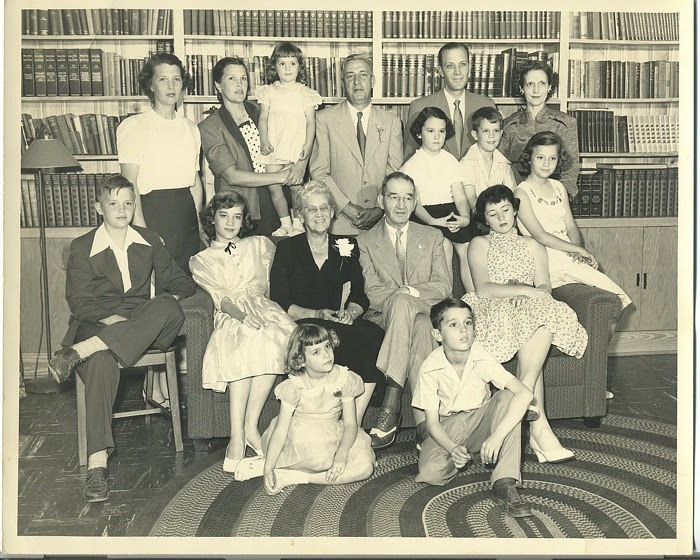
Speth, seated on the left, was about eleven years old when this family photo was taken circa 1953. (Photo: Chelsea Green Publishing)
CURWOOD: So, Gus, you write that witnessing the civil rights movement up north from the vantage point of Yale in part led you to join the environmental cause. Can you explain that?
SPETH: We were children of the '60s. We had been through the civil rights revolution, we had seen the importance of litigation, of demonstrating and protesting, of pushing your cause, of getting powerful legislation like the civil rights legislation of '64 and '65 and that was our model. All of us who went on to start the Natural Resources Defense Council which we opened the doors in 1970, we were inspired deeply by what the black community in the United States are done to assert their cause, and we wanted to do that with the environmental cause, to get the issue to Washington, to get legislation, to litigate to make those laws come alive, to protest if necessary and the tragedy is that having been so inspired and in that sense so close to the civil rights movement, we didn't immediately reach out to that movement and work assiduously to bring the black community into this environmental fold. We were at that point very much of a white middle-class movement and I look back now and I say this is a huge failure on our part.
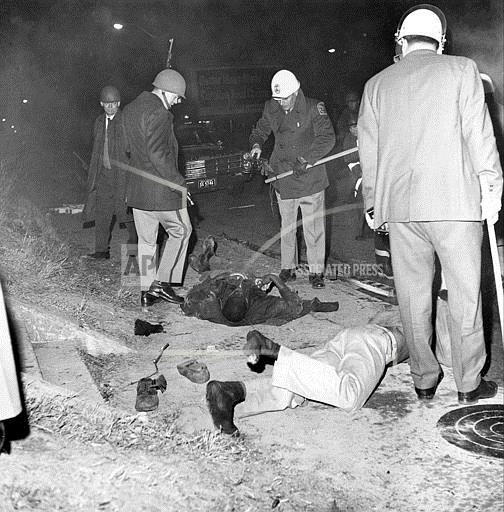
Growing up white in Orangeburg, South Carolina, Speth lived during the heart of Jim Crow segregation, but only became fully aware of its injustice as a student at Yale. His hometown’s racial tensions precipitated a crisis when, in 1968, police opened fire on protestors in what’s now called the Orangeburg Massacre. (Photo: Chelsea Green Publishing)
CURWOOD: Your story has an interesting resonance with my own. I took up of environmental journalism because I saw the environment being treated the way that people of color are being treated -- still today in many places. In other words, abused, discriminated against, in some cases, literally enslaved. Growing up black in America I realize that the establishment could be wrong and when I saw what was going on in terms of environmental change, I said, "This is the most important story going," despite the fact the establishment would like to ignore it.
SPETH: Well we had a similar experience then because I also...when this cultural scaffolding that I've described collapsed, one of the great learnings that came out of that for me was that we don't have to accept the status quo, the system is not helping us. In my recent writings, I've been saying we need to rediscover the radical roots of the environmental movement if we really ever want to finally win some of these battles like climate change. There were deeper challenges to our economy and to our political system in the late '60s and early '70s then we hear today, and when you look at what the two groups -environmentalists and the blacks - are saying, it's very similar. The system is the problem. This system is at the root of the environmental ills. It is at the root of this vast economic insecurity and inequality and injustice that affects our minority communities as well as others.
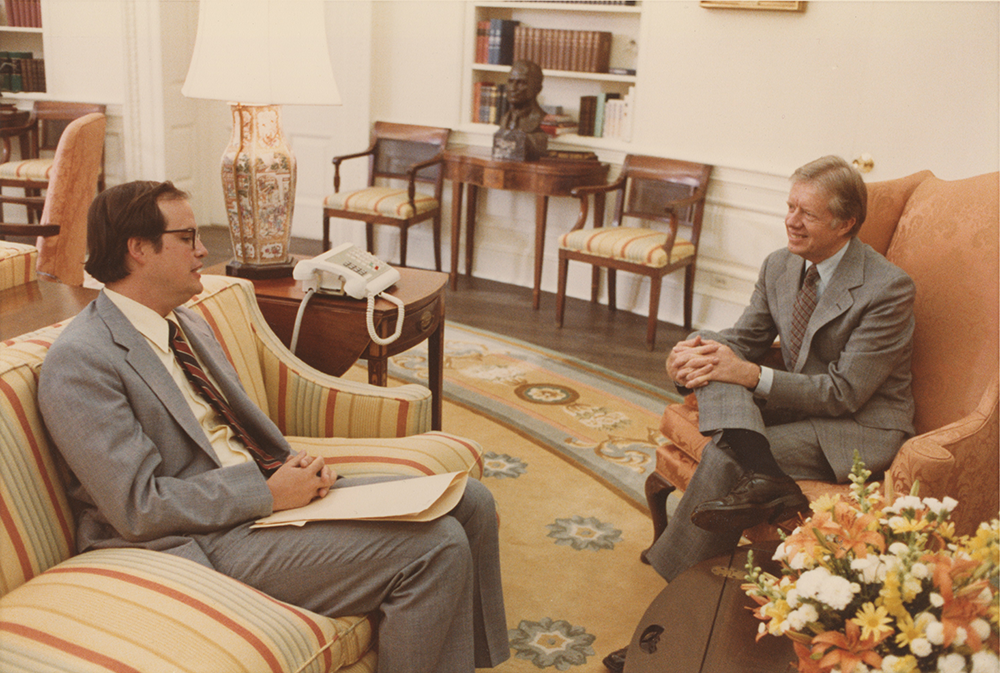
As Chair of the Council on Environmental Quality, Speth advised Carter on environmental issues during his presidency. (Photo: Chelsea Green Publishing)
CURWOOD: I want to quote from you and your book: "In launching NRDC we set out to change the system but we didn't. We improved the system in places, made it safer, better, but in doing so we became part of the system. It changed us." So to what extent do you think it was necessary to become a part of the system and to be changed by it in order to get the work you accomplished done?
SPETH: Well I think what we did was a good thing and that good thing was to take our talents and bills and turn them to getting powerful new laws like the Clean Air Act and the Clean Water Act and the National Environmental Policy Act and the Endangered Species Act and the Wilderness Act and others implemented. Those were great accomplishments, but in the process we became more and more inside the beltway of Washington and we dropped a lot of the early proposals for deeper change that were put forward around 1970, proposals to challenge growth, proposals to challenge values, to challenge the distribution of income that people saw as necessary if we were going to deal effectively with the longer-term environmental challenges. And then as Washington became more and more conservative we had to be tamer in a way, to be effective within that system.
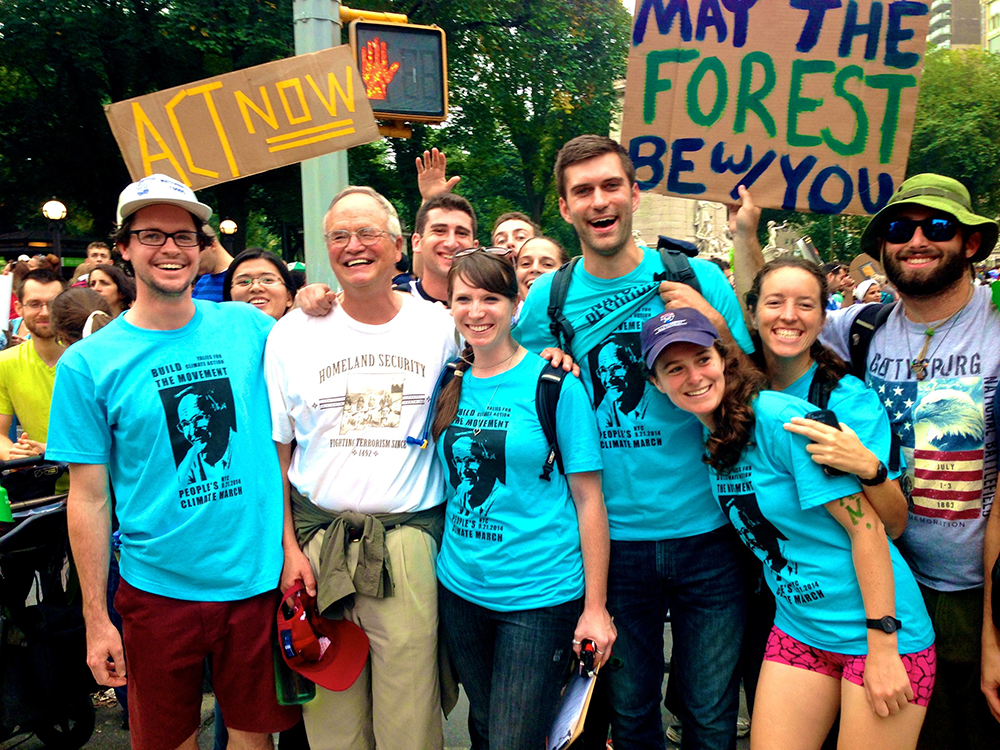
Speth points to the People’s Climate March, which took place in New York in September 2014, as a sign of increasing democratic engagement. He marched with students from the Yale School of Forestry and Environmental Studies, where he formerly served as dean. The students printed shirts with Gus’s photo and a quote from his 2008 book The Bridge at the Edge of the World: “Build the movement.” (Photo: Chelsea Green Publishing)
CURWOOD: Gus, you were arrested in front of the White House, a place where you had a pass as a presidential counselor, protesting the Keystone pipeline. Yet you write, "While I don't mind being thought of as radical, that's not how I view myself." Well, how do you see yourself?
SPETH: Well I think we need to get beyond the sort of traditional environmentalism that we've had now for decades and into embracing a new environmentalism and we have to ask ourselves, "You know, what's an environmental issue?" And if the answer is air pollution, water pollution, climate change...then we're really right where we've been. But what if an environmental issue is something that has a big effect on environmental outcomes, on our prospects of leaving a good environment to our children and grandchildren? Well, then an environmental issue includes things like the health of our political system and sustaining our failing democracy and not just sustaining our natural areas. The things that affect environment outcomes are politics and the ascendancy of money power over people power, and all the other flaws that are undermining our democracy. We have huge economic and social insecurity in our country and when you have that, all Mitch McConnell has to say when he opposes a climate regulation, all he has to say is, "It's going to hurt the economy, lose jobs, raise prices," and that scares people. It scares enough people that they don't get a lot of momentum on some other climate initiatives that we desperately need. So doing something about this vast economic insecurity is an environmental issue, but if those views are radical, I stand accused. But I don't think they are any more radical than where people were in our political leadership not long ago. In Franklin Roosevelt's second Bill of Rights he said that the people should have a right to a decent job, to income security, to a good education. He didn't say anything about the environment because at that point it wasn't really an issue.
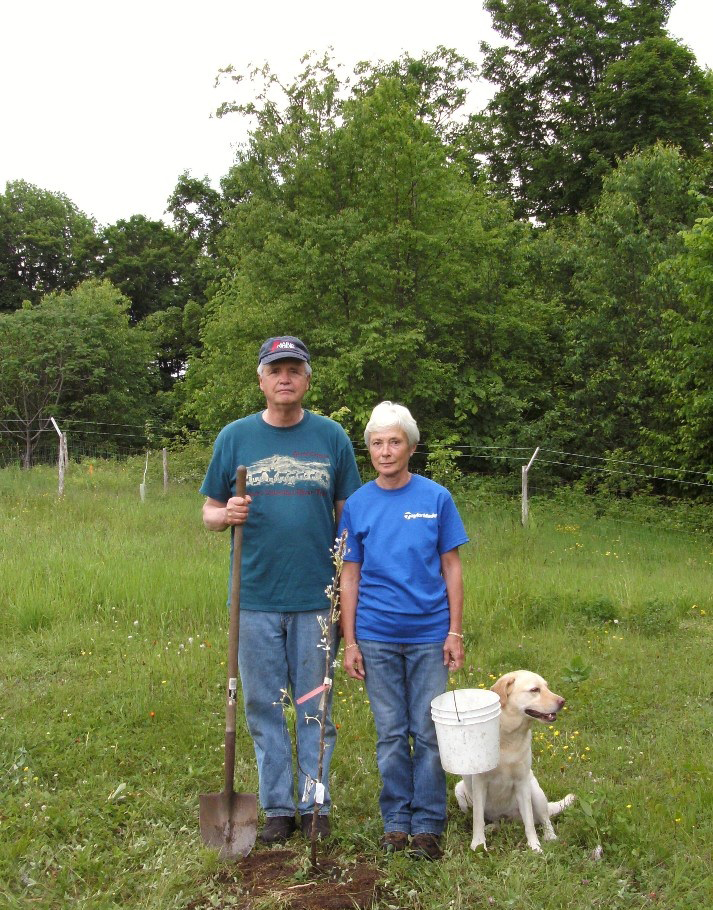
Gus Speth and his wife of nearly fifty years, Cameron, live in rural Vermont. (Photo: Chelsea Green Publishing)
CURWOOD: Is your view among a number people to say that our current system is broken? In your view how do we fix it?
SPETH: It's very important to try to identify the things that can be done. And certainly the issue of corruption of our system by big money, I mean, look at what the Koch brothers are doing now, putting almost $1 billion on the table for the election. I think we need legislation to undermine that kind of money by creating a powerful system of public financing of elections. Another thing we could do would be to have an ethical proposition adopted at all levels in our legislatures that said that if you're on a committee that is regulating a particular industry you cannot take any funds from that industry. There are other things that can be done to guarantee the right to vote, to make it easy to vote, there are things that can be done to improve the competitiveness of our Congressional Districts. There are ways to undermine the Electoral College, to move to a popular vote for president. We all have a stake in seeing a better democracy, and maybe this Koch brothers putting up close to a billion dollars will finally be the incentive that brings all the progressives and even tea party people and others together to promote political reforms. We really need to save our democracy from his creeping corporatocracy and plutocracy that we see going on now in the country.
CURWOOD: One thing you focus on in your book is modern capitalism as a major source of environmental ills now on the planet. What ways would you see to maximize the benefits of capitalism while minimizing its harms, especially to the environment?
SPETH: Right. Well, there are lots of models in Europe that you could call capitalism that are really social democracy initiatives, but it's very different from the capitalism that dominates, which is a ruthless system, a rapacious system, one driven by profit at all costs and allied with a political system which seeks to largely project national power around the world. But we live and work in an operating system which we can call modern capitalism, but in my view, we need to challenge that system with the deep reforms, deep changes, and drive these systemic changes so deeply that we emerge with a really different system of political economy and then the core of that system is that it gives true and honest priority to people and place and planet, and not to profit and product as GDP and national power. One thing that's critical to this new system is that we have a functioning political system that is truly democratic, and that that democratic political system has a huge say in the direction of investments in the country. We are so underinvesting in things that would have gigantic social and environmental payoffs for us and investing so heavily and almost exclusively in things that have high financial returns with not much democratic control over the direction of our economy and where we're really putting our money and what we're doing for our society and for the future. This type of economic democracy is part of the new economy that we need and is something that the new environmentalism ought to be embracing and promoting.
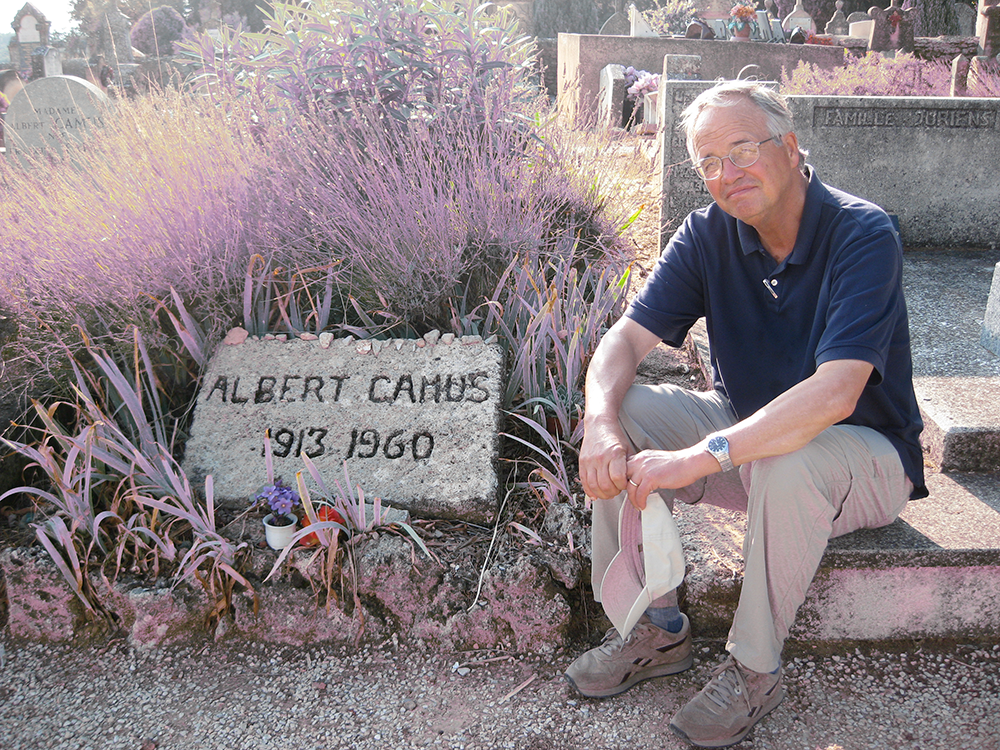
Speth chooses to view the climate struggle in the way that Albert Camus interpreted the Greek myth of Sisyphus: that there is meaning in the struggle itself, despite inevitable failure. In Greek mythology, Sisyphus was condemned by the gods to the futile task of repeatedly rolling a rock to the top of a mountain, only to watch it fall back down again. Above, Speth visits Camus’ gravesite in Provence. (Photo: Chelsea Green Publishing)
CURWOOD: Gus, you write in your memoir that the failure of the US to lead the world on the climate issue over the past three decades, and I'm quoting you here is, "...probably the greatest dereliction of civic responsibility in the history of the Republic". In your view, what would it take to reclaim that responsibility?
SPETH: You know, we put out in the Carter administration several reports calling for action on climate. We knew back then 35 years ago what was needed and then we called for changes in energy policy and forest policy and other things to address this problem while we still had time. Well, we have done almost nothing, and now we are seeing the effects, the very serious effects of a fairly modest amount of global warming and we'll get more warming even if we stop all emissions today. If we want to save the planet's climate for children and grandchildren, we've got to act in a dramatic and drastic way starting now and wring the fossil fuels out of our energy system over the next 35, 40 years. I'm delighted to see the President taking finally, some steps to sustain our climate but they are very modest compared with what we really need. It's unfortunate that the Congress is not willing to go further, so that means we've got to act at the state level, we've got to act at that town level, city level, our individual level, but importantly we're going to have to build up a mighty political force and we saw the beginnings of that I think with the 400,000 person march in late September in New York on climate and climate justice, but Steve you know, being really realistic about it, I think it's going to take a worse crisis in the climate here than we seem to get the kind of response that we need here and abroad.
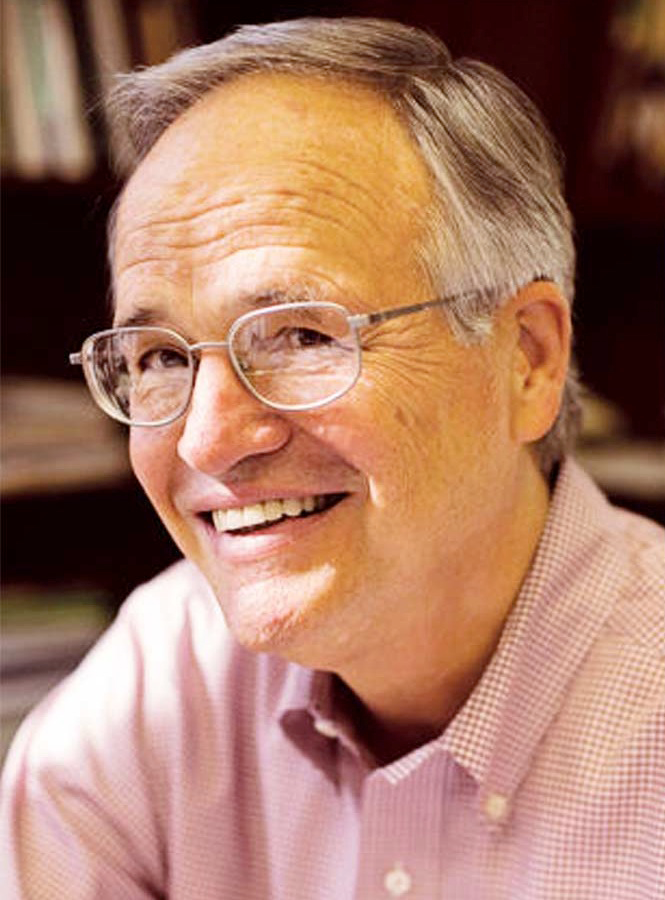
Speth teaches at Vermont Law School and is a senior fellow at the Democracy Collaborative. (Photo: Chelsea Green Publishing)
CURWOOD: Gus, how would you most like to be remembered?
SPETH: Oh my, I guess I would...I'd most like to be remembered up as a good person who took care of his family and his friends as best he could. The biggest issue in my life professionally has been the climate issue. It would be wonderful to show big results, but it's also wonderful in a way to at least have tried. As Camus said in the Book of Sisyphus, "The struggle is important itself, and that if we don't win in everything or even anything, we will at least have struggled hard and that's our salvation."
CURWOOD: Gus Speth currently teaches at Vermont Law School. His memoir is called "Angels by the River". Gus, great to talk with you again.
SPETH: Thanks so much, Steve, for this opportunity.
Related links:
- “Gus Speth: ‘Ultimate insider’ goes radical”
- “Environmental Failure: A Case for a New Green Politics”
- “Off the Pedestal: Creating a New Vision of Economic Growth”
- Yale e360’s “Five Questions for Gus Speth on his Environmental Evolution”
- Global 2000 Report to the President by Gus Speth (1980)
- Angels by the River
- “America the Possible,” our report
- “Red Sky at Morning,” our report
- Environmentalism during Obama’s first 100 days in office, our report with Gus Speth
[MUSIC: Joshua Rifkin, Ragtime Nightingale by Joseph Lamb, Decca, 1991]
CURWOOD: Living on Earth is produced by the World Media Foundation. Our crew includes Naomi Arenberg, Bobby Bascomb, Emmett Fitzgerald, Helen Palmer, Adelaide Chen, Jenni Doering, Lauren Hinkel, James Curwood, Jennifer Marquis, and John Duff.
Our show was engineered by Tom Tiger, with help from Jake Rego, Noel Flatt and Jeff Wade. Alison Lirish Dean composed our themes. Alison Lirish Dean composed our themes. You can find us anytime at LOE.org - and like us, please, on our Facebook page - it’s PRI’s Living on Earth. And we tweet from @LivingOnEarth. I'm Steve Curwood. Thanks for listening.
ANNOUNCER1: Funding for Living On Earth comes from the Grantham Foundation for the protection of the environment, supporting strategic communication and collaboration in solving the world’s most pressing environmental problems. The Kendeda Fund, furthering the values that contribute to a healthy planet, and Gilman Ordway for coverage of conservation and environmental change. Living on Earth is also supported by Stonyfield Farm, makers of organic yogurt, smoothies and more. www.stonyfield.com.
ANNOUNCER2: PRI. Public Radio International.
Living on Earth wants to hear from you!
Living on Earth
62 Calef Highway, Suite 212
Lee, NH 03861
Telephone: 617-287-4121
E-mail: comments@loe.org
Newsletter [Click here]
Donate to Living on Earth!
Living on Earth is an independent media program and relies entirely on contributions from listeners and institutions supporting public service. Please donate now to preserve an independent environmental voice.
NewsletterLiving on Earth offers a weekly delivery of the show's rundown to your mailbox. Sign up for our newsletter today!
 Sailors For The Sea: Be the change you want to sea.
Sailors For The Sea: Be the change you want to sea.
 The Grantham Foundation for the Protection of the Environment: Committed to protecting and improving the health of the global environment.
The Grantham Foundation for the Protection of the Environment: Committed to protecting and improving the health of the global environment.
 Contribute to Living on Earth and receive, as our gift to you, an archival print of one of Mark Seth Lender's extraordinary wildlife photographs. Follow the link to see Mark's current collection of photographs.
Contribute to Living on Earth and receive, as our gift to you, an archival print of one of Mark Seth Lender's extraordinary wildlife photographs. Follow the link to see Mark's current collection of photographs.
 Buy a signed copy of Mark Seth Lender's book Smeagull the Seagull & support Living on Earth
Buy a signed copy of Mark Seth Lender's book Smeagull the Seagull & support Living on Earth

